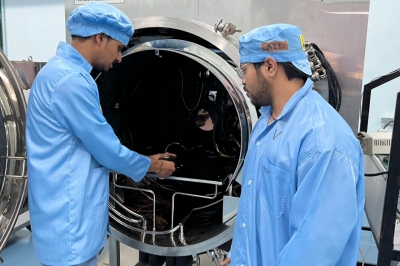Scientists observe Parkinson’s ‘trigger’ in human brain tissue

New Delhi, Oct 2 : Scientists have, for the first time, directly visualised the way Parkinson’s disease gets ‘triggered’ in human brain tissue.
Using a newly developed technique, called ASA-PD (Advanced Sensing of Aggregates for Parkinson’s Disease), researchers from the University of Cambridge and University College London, UK, could see, count, and compare the protein clusters called alpha-synuclein oligomers in human brain tissue.
Oligomers have long been considered the likely culprits behind Parkinson’s, but until now, these tiny clusters — just a few nanometres long — have evaded direct detection in human brain tissue.
Using ASA-PD with ultra-sensitive fluorescence microscopy, the team could, for the first time, detect and analyse millions of oligomers in post-mortem brain tissue.
“This is the first time we’ve been able to look at oligomers directly in human brain tissue at this scale: it’s like being able to see stars in broad daylight,” said Dr. Rebecca Andrews, who conducted the work when she was a postdoctoral researcher at Cambridge’s Yusuf Hamied Department of Chemistry.
“It opens new doors in Parkinson’s research,” she added.
Since oligomers are so small, their signal is extremely weak. But ASA-PD maximises the signal while decreasing the background, dramatically boosting sensitivity to the point where individual alpha-synuclein oligomers can be observed and studied.
The team examined post-mortem brain tissue samples from people with Parkinson’s and compared them to healthy individuals of similar age.
The results, reported in the journal Nature Biomedical Engineering, showed that oligomers exist in both healthy and Parkinson’s brains.
The main difference between disease and healthy brains was the size of the oligomers, which were larger, brighter, and more numerous in disease samples, suggesting a direct link to the progression of Parkinson’s.
The team also discovered a sub-class of oligomers that appeared only in Parkinson’s patients, which could be the earliest visible markers of the disease, potentially years before symptoms appear.
“Oligomers have been the needle in the haystack, but now that we know where those needles are, it could help us target specific cell types in certain regions of the brain,” said Professor Lucien Weiss from Polytechnique Montréal, who co-led the research.
Weiss noted that similar technologies could be applied to other neurodegenerative diseases like Alzheimer’s and Huntington’s.
(IANS)






